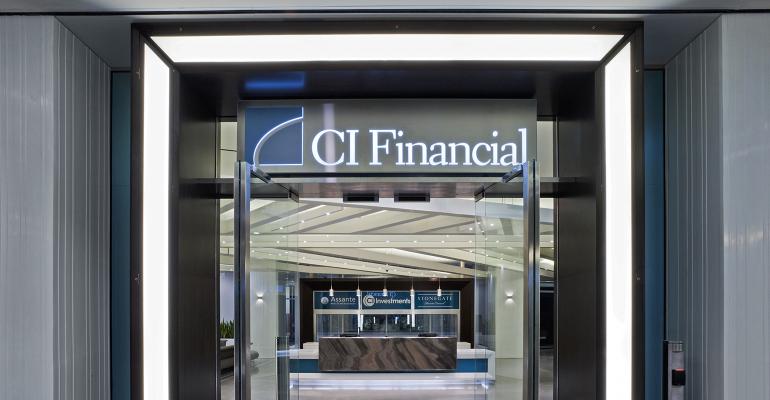It’s been a big year for Canadian wealth management firm CI Financial.
After planning for months to sell as much as a fifth of its U.S. wealth management business in a public offering to pay down a company-wide debt ratio of more than four times earnings (around $2.9 billion in U.S. currency), the firm announced in May that it would instead sell a 20% stake to a syndicate of investors—including Bain Capital, Abu Dhabi Investment Authority and the state of Wisconsin—for a little more than $1 billion.
The proceeds from that transaction, as well as the sale of Congress Wealth Management to Audax Private Equity for $112 million in April, enabled CI to reduce net leverage by around $746 million, repurchase 17 million shares and increase dividend payouts by 11% to $0.60 per share beginning in the fourth quarter of this year.
CEO Kurt MacAlpine said CI’s board decided to cut the dividend in half to C$0.72 per share five years ago in response to “the challenging operating environment and relative positioning of the business.” In early 2018, CI was paying out almost 60% of adjusted income in dividends across 261 million outstanding shares and had the lowest net inflows and worst aggregate investment performance of its Canadian peers.
“Over the last five years, we've worked incredibly hard to transform and reposition the business for sustainable and highly profitable growth,” he said.
Following a splashy entrance into the U.S. wealth management market, a major restructuring effort and the recent influx of fresh capital, the firm has managed to increase earnings while reducing the number of shares outstanding. Even with the 11% increase, 2024 dividend payments are expected to account for only a fifth of annual adjusted revenue.
Still, the firm reported Thursday adjusted earnings were essentially flat at around $183 million, down from $186 million in the first quarter and about $187 million a year ago.
Earnings for CI Private Wealth dropped by about 2% from the first quarter quarter but by more than 25% from the same time last year, the firm reported, while the Canadian asset management business lost ground in the second quarter due to one-time stock-based compensation expenses, according to CFO Amit Muni. On an adjusted basis, asset management has seen declining revenue over four consecutive quarters, down by 12.5% over the last 12 months.
South of the border, however, newly branded Corient—the name for the bank's U.S.-based private wealth business—grew quarterly earnings by nearly half over the same time last year, and year-to-date numbers show a 42% increase over the first half of 2022.
After first entering the U.S. market in early 2020, Corient now accounts for close to half—$194 billion—of CI’s cumulative $362 billion in assets.
The firm racked up billions in debt (and some industry ire) scooping up dozens of stateside RIAs, and a decision was eventually made to spin off the U.S. wealth management business in anticipation of an initial public offering that would pay down the debt kept on the Canadian balance sheets. In late 2022, CI filed an S-1 with the SEC to take the U.S. company public and subsequently delisted the Canadian business from the New York Stock Exchange in January.
Then the firm’s stock dropped by almost half and CI’s credit rating was downgraded by S&P Global Ratings. In April of this year, based on expectations that the debt ratio would remain above four times EBITDA, S&P again dropped the ratings—from BBB- to BB+ this time—before ceasing coverage at the firm’s request.
About a month later, the sale to Bain, and other investors, was announced.
An eventual IPO is still the objective, but on hold “for a later time when the markets will be more constructive,” according to someone with knowledge of the deal.
CI has been working to integrate its U.S. acquisitions under a single unified brand, culminating in the roll-out of an integrated technology platform and new branding last month. The firm has centralized its tax planning and preparation services, along with its investment platform and estate planning and trust services.
Over the last 12 months, U.S. operating margins have improved by 5.6%, the firm reported.
“What started as a business focused on acquisitions of leading capabilities and creating a foundation for growth has quickly evolved into the largest integrated RIA business in the U.S.,” said MacAlpine. “In 2020, when a firm joined us, we acquired the business as is, with the integration to follow. Today, when a firm joins us, on the first day they're fully onboarded to our operating platform. This includes our ADV, integrated technology, cybersecurity, marketing, finance, legal, HR and compliance functions.”
Corient is now in the process of consolidating its brink-and-mortar footprint in regions with multiple locations, he said.





